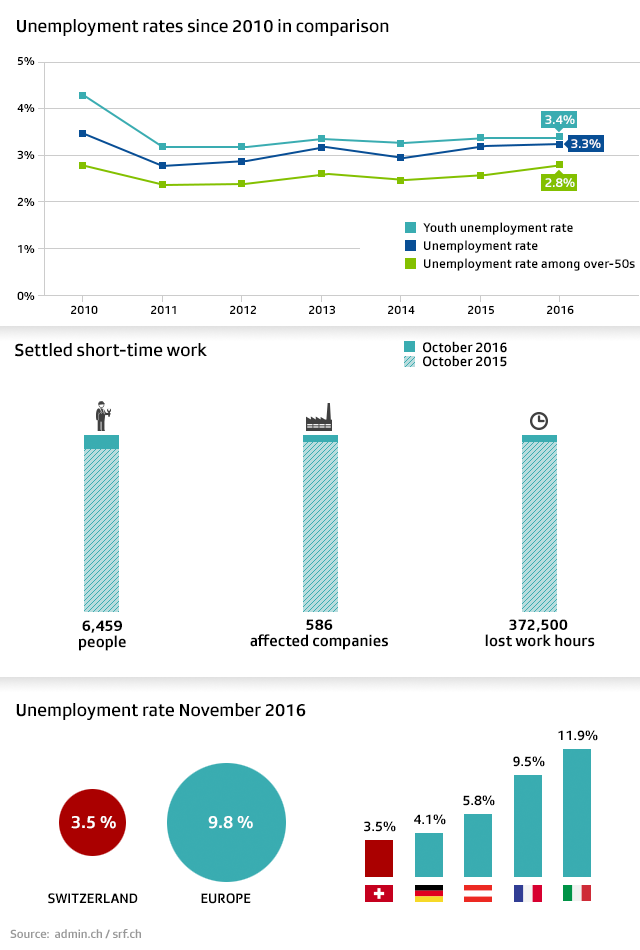More workers forced to work shorter hours

A small increase in the Swiss unemployment rate in 2016 has masked the impact of the strong franc on jobs. Almost 10% more workers were made to work fewer hours to save their jobs.
According to figures released by the State Secretariat for Economic Affairs (SECO) on Tuesday, the annual Swiss unemployment rate rose to 3.3% in 2016, a 0.1 point increase on the previous year. This may appear insignificant compared to the average European unemployment rate of 9.8% but it hides the very real problem of those forced to make up for the financial loss faced by their employers due to the strong franc.
A total of 6,459 workers were made to reduce working hours in October 2016 compared with 5,981 in October 2015, a sign that certain parts of the Swiss economy – mainly exporters – are still feeling the pain of the Swiss National Bank’s decision to stop pegging the Swiss franc to the euro on January 15, 2015. Less than two weeks after this decision the government allowed companies to introduce short-time work – in which people work fewer hours while the state tops up their pay – in the hope that it would help preserve jobs.

Since 2008, when the franc began appreciating against the euro, some CHF20 billion ($19.7 billion) a year has been lost from Swiss GDP. According to the unions, tens of thousands of jobs have been lost because of the monetary shock that followed the abolition of the euro peg. Particularly sensitive to global competition, the Swiss machine tool industry has seen the number of employees slashed by 10% since the appreciation of the franc, while simultaneously, employment in the same sector in Germany has grown by 30%.
According to a recent survey done by consulting firm Staufen.Inova, three out of four of 180 Swiss companies questioned described the strong franc as a curse to their business and over half have not yet overcome the consequences. The majority planned on improving efficiency to counteract the loss of business but one firm in three plans to relocate at least a part of their operations abroad to minimise costs.
Optimism for 2017
The mood is not all doom and gloom though. The Staufen.Inova survey states that companies are guardedly optimistic about 2017 with four in ten counting on an economic recovery in Europe and a strong dollar to improve their bottom lines. In a Deloitte surveyExternal link of 101 Swiss Chief Financial Officers released on Tuesday, 64% rated the prospects of their company over the next 12 months as positive. While the strong franc ranked second on their list of concerns, it was overtaken by their anxiety over geopolitical risks.
The key sectors of Swiss economy are expected to do better in 2017. According to a Credit Suisse reportExternal link published on Tuesday, the mechanical, electrical, and metal industries (MEM) – that took most of the beating from the strong franc – are expected to rebound for the first time in two years. A stabilising Swiss franc as well as growth in export market countries will help stop the decline. The watch industry is unlikely to grow in 2017, as watch buyers may stay away from Europe due to terror threats. The tourism sector will return to stability and may even grow slightly while chemical and pharma industries will continue to flourish due to a global demand for health products.

In compliance with the JTI standards
More: SWI swissinfo.ch certified by the Journalism Trust Initiative











You can find an overview of ongoing debates with our journalists here . Please join us!
If you want to start a conversation about a topic raised in this article or want to report factual errors, email us at english@swissinfo.ch.